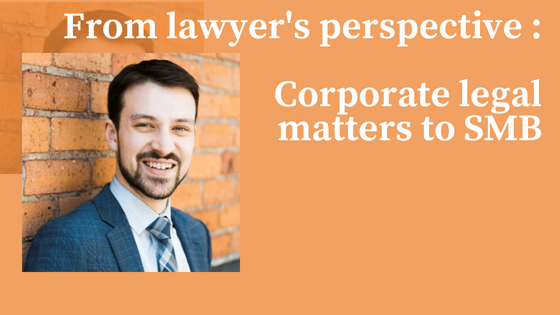Starting a business is never easy. Having some professional guidance along the way will be a big help. Today it is my pleasure to invite Samuel Michaels, a corporate and employment lawyer, to tell us more about corporate legal matters that may concern business owners.
Samuel is the founding lawyer at SM Legal (www.smlegal.ca), a North York based law practice. He is also the founder of Canada Legal Help (www.canadalegalhelp.com), a legal resource website that Samuel started while studying at Osgoode Hall Law School. Samuel practices in the areas of corporate, employment, and estates law.
Alex: Samuel, thanks for spending the time with me to go through some popular questions that concern many business owners. First of all, a lot of businesses don’t have a corporate lawyer in handling incorporation, shareholders agreement, etc. What is the benefit to retain a lawyer in handling those matters?
Samuel: In terms of incorporation, the main benefit is to ensure a properly drafted Articles of Incorporation, and a properly prepared minute book. The articles describe the shares in the company, and the minute book lists the shareholders. Without these being properly prepared, the company could face major issues if there is a shareholder dispute or tax audit. For the shareholders agreement, this document will protect your company in case a shareholder wants to leave or needs to be removed. It is a complex and specifically worded document, and not having a properly drafted shareholders agreement could lead to major disputes within the business.
Alex: What are your suggestions for individuals when they like to start the business? What’s your advice to them in terms of corporate structure?
Samuel: It depends on the business, but generally I favour a straightforward ownership structure rather than something overly-complex. When people tell me that they are starting a business, I often ask their anticipated first year revenue and in which industry will they be working. If there are liability risks in the industry, or tax incentives based on anticipated revenue, it will likely make sense to structure the business as a corporation.
Alex: Samuel, I heard people start the business by completing master business registration. What is that and why do we need that? If a business name idea has been taken in master business registration, am I not allowed to register again?
Samuel: Every ongoing profit-oriented activity in Ontario needs to be registered, whether as a sole-proprietorship, incorporation, or under another form. If a name has been taken already, you are allowed to apply again with a different name.
Alex: That’s interesting. When it comes to a corporate name, a lot of people want their unique name. What about a number company? What is your advice in naming the company?
Samuel: If the company does not have any “public facing” operations, then it can certainly be a numbered company. If you are naming a company, the name needs to be specific, unique, and there should be a purpose or reason behind the name.
Alex: That makes sense. I know some clients register a federal corporation as compared most people just register an Ontario incorporation. What is the difference?
Samuel: The most practical difference is in cost. It is cheaper to incorporate federally; however, federal incorporation must pay an annual renewal fee whereas Ontario corporations do not. After about 6-7 years, owning the Ontario corporation becomes less expensive for this reason. In terms of legal difference, an Ontario corporation can only register to be active in Ontario, whereas a federal corporation can register to be active in any province. Generally, I only recommend federal incorporations for clients who are positive that they will be operating in multiple provinces.
Alex: This is a real case. As you know, all Ontario companies must have at least one director and this person must be a resident Canadian. So this individual did his friends’ a favor and accepted a director role in a newly incorporated business without too much consideration as the rest of directors are non-residents. What is the risk exposure for this individual from legal perspective?
Samuel: There is substantial risk exposure for this individual. Director’s can be liable for negligence based on the company’s activities, in some circumstances, whether or not they were even directly involved with those activities. There’s nothing wrong with volunteering as a director for a corporation, but the director should sign an indemnity agreement with the shareholders so it is clear to everyone involved who is responsible for the business.
Alex: We talked about startups in creating different classes of shares for strategic investors before. Can you shed some lights on this area? I know many startups look for investors’ funding but have no idea how the entire thing works out from a legal perspective.
Samuel: It can be quite confusing! I actually wrote about how share descriptions, classes, etc. all come together in one of my blogs here: http://smlegal.ca/21-questions-incorporation-basics/. To summarize, in a corporation’s Articles you can assign different rights and entitlements to different “classes” of shares. For example, you can make Class “A” Shares have the right to vote, and Class “B” Shares don’t have the right to vote, but get a guaranteed dividend rate. The number of classes and rules for each class are set by the company based on its requirements.
Alex: Samuel, I am sure your blog has more details in setting up share structures. On the other end, I have seen many businesses are behind their compliance work like annual information filing, minutes, share subscription certificate, resolutions, etc. Why are those documents important?
Samuel: every year, a corporation should add resolutions to its minute book for an annual general meeting, the approval of financial statements, and the audit of the company. It is not always necessary to hold a meeting or complete an audit, but a company that decides to forego either should still draft a resolution to that effect. If your company’s minute book isn’t up to date, it could cause serious issues in case of a tax audit or if the company is sued.
Alex: Thanks Samuel. I am sure readers will enjoy reading your advice. Again, it is always recommended people should consult professionals if they have any concern in the business from legal, tax or compliance areas.
Samuel: My pleasure. I’m always available to help businesses navigate the various corporate legal hurdles. My email is sam@smlegal.ca and I can also be reached by phone (647) 409-8907. Cheers!


Recent Comments